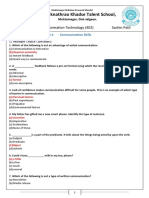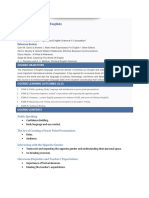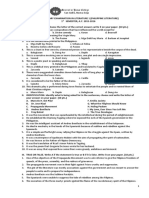0% found this document useful (0 votes)
44 views9 pagesComputer Worksheet
The document is a summer assignment for Class X students at La Matina School, focusing on communication and self-management skills. It includes multiple-choice questions covering various aspects of effective communication, such as verbal and non-verbal methods, barriers, feedback, and the importance of self-management in personal and academic success. The assignment aims to enhance students' understanding of these essential skills.
Uploaded by
aartigupta8874312308Copyright
© © All Rights Reserved
We take content rights seriously. If you suspect this is your content, claim it here.
Available Formats
Download as PDF, TXT or read online on Scribd
0% found this document useful (0 votes)
44 views9 pagesComputer Worksheet
The document is a summer assignment for Class X students at La Matina School, focusing on communication and self-management skills. It includes multiple-choice questions covering various aspects of effective communication, such as verbal and non-verbal methods, barriers, feedback, and the importance of self-management in personal and academic success. The assignment aims to enhance students' understanding of these essential skills.
Uploaded by
aartigupta8874312308Copyright
© © All Rights Reserved
We take content rights seriously. If you suspect this is your content, claim it here.
Available Formats
Download as PDF, TXT or read online on Scribd
/ 9



















































































